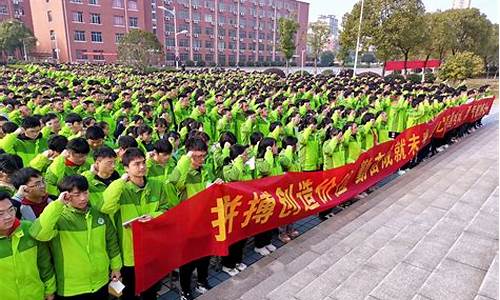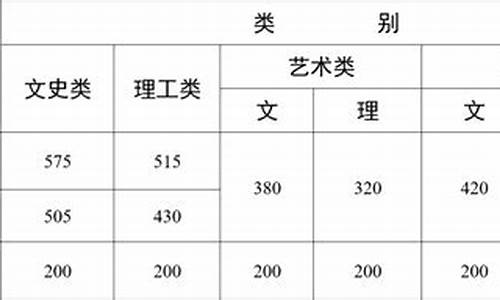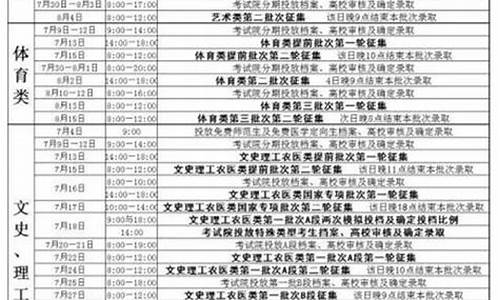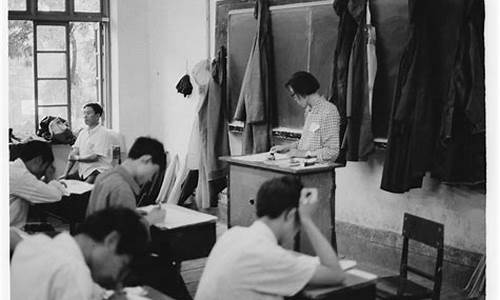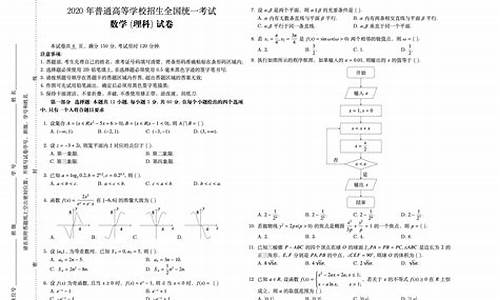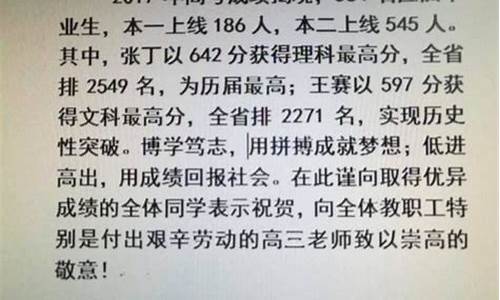动词高考真题,英语高考动词828个
1.高考英语语法考点总结
2.怎样看这道题考的是非谓语动词还是动词的时态和语态
3.英语短语
4.非谓语动词题
5.英语周报2013-2014高三外研版第32期总第3216期答案,动词
6.高考的语法题中如何区分位于动词和非谓语动词
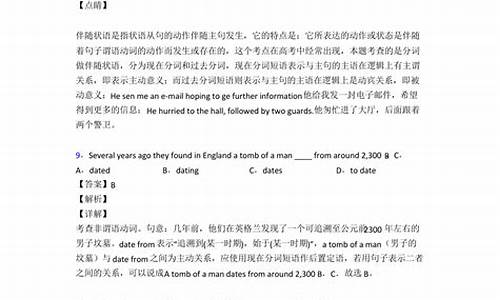
一道93年英语高考选择题
____ he said at the meeting astonished everybody present.
A. What B. That C. The fact D. The matter
1. 为什么不可以选c和d?
2. 如果把这道题改成“____ he told at the meeting astonished everybody present.”
答案可否选c和d?
我觉得虽然不可以说“say the fact“,但是可以说“tell the fact”吧
答:英语单选题只有一个最佳答案。选其它者不得分,想得分则必须选A,不选CD。
译:他在会上说的话让在场的每一个人大吃一惊。
析:此题考主语从句。what he said at the meeting= the words that he said at the meeting 是名词性从句,在句中作主语。合句意,合语法为最佳选择。
1. 如选择C,则可认为主语是the fact, he said at the meeting 是省略了关系代词的定语从句,从句法形式上是通的。这个事实让在场的每一个人大吃一惊。句意也通。但我还没有加入这个限制性定语。是哪个事实呢?是那个他在会上说的事实。汉语似乎很通顺,说的=》说出来的,但英语是不是通顺呢?我们需要看一看say这个及物动词的英语说法,动宾搭配。查词典及平时的语言实践我们知道,say的宾语,一般多为“直接引语”或间接引语。如果按名词,则主要“a sound, word,etc”如: He didn't say a word. You must learn to say "please", young man!
它还常跟不定代词something, 如say something about your family. 疑问句中就用what:What did he say? 除此之外,没见过有say a fact, say a matter这样的动宾搭配。所以选择CD不合英语的语言习惯。排除CD
你也有这个感觉:不可以说“say the fact”。
2. 但是可以说“tell the fact”吧?
答:是的,但tell一般都用作双宾语:tell sb. sth. 告诉某人某事。可以说tell us a story/a fact/ a matter的。只有在一定的语境中,才可以省略这个间接宾语。
所以,如果你非要选CD,则要将said 改为told us才妥:
____ he told us at the meeting astonished everybody present.
A. What B. That C. The fact D. The matter
这样一来,本题就有三个“正确”答案了,ACD,且每一个都合语法,合句意:
他在会上告诉我们的(那事情A)/(那事实B)/(那问题)让在场的每一个人都大为吃惊。
那就成为一个不好的题了。除非在题句后加上一句:Which is NOT correct? 答案为B。
高考英语语法考点总结
非谓语动词练习 —— 高一英语试题
动 名 词 专 项 练 习
1. It took the workmen only two hours to finish ________ my car.
A. repairing B.repair C.to repair D.repaired
2. It’s no good ________ over split milk.
A. to cry B.crying C.cried D.cry
3. Have you forgotten ___________$1000 from me last month? Will you please remember _________ it tomorrow?
A. borrowing; to bring B.to borrow; bring
C.borrowed; bringing D.borrowing; bringing
4. The classroom wants __________.
A. clean B.cleaned C.to clean D.cleaning
5. Jack said that he wouldn't mind ___________ for us.
A. to wait B.wait C.waiting D.waited
6. My brother keeps _________ me with my work.
A. to help B.help C.helping D.helped
7. We should often practise _________ English with each other.
A. to speak B.spoke C.speak D.speaking
8. Keep on _________ and you will succeed.
A. a try B.try C.triing D.trying
9. His parents insist on ____________ to college.
A. he should go B.he go C.his going D.him to go
10. The story was so funny that we ___________.
A. couldn’t help laugh B.can’t but laugh
C.couldn't help laughing D.couldn’t help but to laugh
11. How much time did you spend __________ the text?
A.copying B.to copy C.in copy D.on copying
12. I ________see you without ________ your mother.
A. never; thinking of B.never; thinking about
C. not; thinks of D.don't; think about
13.Though it sounds a bit too dear(昂贵),it is worth _________.
A. being bought B.buying C.to buy D.buying it
14. The novel is well _________.
A. worth to read B.worth being read
C.worthy to read D.worthy of being read
15. The farmers were busy __________ cotton.
A.to pick B.picking C.with picking D.pluck
高一全国中学生英语能力竞赛非谓语动词专项训练(一)
根据所给的中文,完成下列句子。
1.Is there any shop in the district ______ (卖水果和蔬菜的)?
2.The man in the picture______ (同外宾握手的)is our headmaster.
3.We must support the people______ (正在为自由和解放而斗争的).
4.There is a car in front of the hotel ______ (等着送你去火车站).
5.“My Old Home" is a story______ (鲁迅在1921年写的).
6.He showed us a photo of the Great Hall of the People,______ (他照的)when he went to Beijing on business.
7.The car______ (正在修理的)is very old.
8.______ (由于受过良好的训练)he has no trouble in doing this kind of work.
9.______ (和我谈话时)he pointed out my shortcomings and gave me some advice on how to improve my work.
10.______ (使用了多年),the machine needs repairing.
参考答案:
1.selling vegetables and fruit 2.shaking hands with the foreign guest
3.fighting for freedom and liberation 4.waiting to take you to the railway station
5.written by Lu Xu in 1921 6.taken by him 7.being repaired
8.Having been well trained 9.While talking with me 10.Having been used
高考英语非谓语动词练习题及参考答案
下面是历年高考题:做做看!
(78)1. I"ve heard him_____ about you often.
A. spoke B. speaks C. speak
(79)2. I"m hungry. Get me something_____.
A. eat B. to eat C. eating D. for eating
(79)3. There isn"t any difference between the two. I really don"t know_____
A. where to choose B. which to choose C. to choose what D. to choose which
79)4, The teacher told them_____ make so much noise.
A. don"t B. not C. will not D. not to
(79)5. I saw him_____ out of the room.
A. go B. had gone C. has gone D. goes
(79)6. I"m going to have my radio
A. fixed B. to fix C. fix D. fixing
(80)7. The workers want us_____ together with them.
A. work B. working C. to work D. worked
(80)8. The officers narrowly escaped_____ in the hot battle.
A. have killed B. to kill C. to be killed D. being killed
(80)9. _____ the letter, he went out to post it,
A. Writing B. Being written C. Having written D. Written
(80)10. If you wave your book in front of your face, you can feel the air_____ against your face.
A. moved B. moving C. moves D. to move
(81)11. Don"t you remember_____?
A. seeing the man before B. to see the man before
C. saw the man before D. to have seen the man before
注;第11题A.D答案均为正确
(83) 12. People couldn"t help_____ the foolish emperor in the procession.
A. laugh at B. to laugh at C. laughing at D. laughing on
(83) 13. What"s the language in Germany?
A. speaking B. spoken C. be spoken D. to speak
(83)14. We"re looking forward_____ the photo exhibition.
A. to visiting B. to visit C. to having visited D. visiting
(83) 15. Our headmaster often told us _____ things for granted.
A. not to have B. not to take C. didn"t take D. not to make
(83)16. The girl_____ under that tree is my sister.
A. sitting B. sits C. is sitting D. sat
(84)17. ___ some officials, Napoleon inspected his army.
A. Followed B. Followed by C. Being followed D. Having been followed by
(84)18. Do you remember_____ me at a party last year?
A. meet B. to meet C. meeting D. met
(85)19. This sentence needs_____
A. an improvement B. improve C. improving D. improved
(85)20. "What are you going to do this morning?"
"I"m thinking of_____ to visit my aunt."
A. go B. going C. having gone D. my going
(85)21. _____ anything about the accident ,he went to work as usual.
A. Not known B. Known not C. Knowing not D. Not knowing
(85)22. "Have you decided when_____?"
"Yes, tomorrow morning."
A. to leave B. to be leaving C. will you leave D. are you leaving
(85)23. I really enjoy_____ that kind of job.
A. do B. doing C. to do D. to be doing
(85)24. "There"s a hole in your bag."
"l know. I am going to have it_____."
A. mend B. mending C. mended D. to be mended
(86)25. The next morning she found the man in bed, _____ dead.
A. lying B. lie C. lay D. laying
(86)26. Tell him_____ the window.
A. to shut not B. not to shut C. to not shut D. not shut
(86)27. Only one of these books is
A. worth to read B. worth being read C. wroth of reading D. worth reading
(86)28. He had his leg_____ in the match yesterday.
A. to break B. broken C. break D. breaking
(86)29. I can"t imagine_____ that with them.
A. do B. to do C. being done D. doing
(87) 30. Most of the people_____ to the party were famous scientists.
A. invited B. to invite C. being invited D. inviting
(87)31. The squirrel was lucky that it just missed _____.
A. catching B. to be caught C. being caught D. to catch
(87)32. Though he had often made his little sister_____, today he was made_____ by his little sister.
A. cry; to cry B. crying; crying C. cry; cry D. to cry; cry
(87)33. They would not allow him_____ across the enemy line.
A. to risk going B. risking to go C. for risk to go D. risk going
(88)34. She didn"t remember_____ him before.
A. having met B. have met C. to meet D. to having met
(88)35. They knew her very well. They had seen her_____ up from childhood.
A. grow B. grew C. was growing D. to grow
(89)36. Do you know the boy_____ under the big tree?
A. lay B. lain C. laying D. lying
(89)37. Go on_____ the other exercise after you have finished this one.
A. to do B. doing C. with D. to be doing
(89)38.There was terrible noise______ the sudden burst of light.
A. followed B. following C. to be followed D. being followed
(89)39. "What do you think of the book?"
"Oh, excellent. It"s worth_____ a second time."
A. to read B. to be read C. reading D. being read
(89)40. She pretended_____ me when I passed by.
A. not to see B. not seeing C. to not see D. having not seen
(89)41. "Good morning. Can I help you?"
"I"d like to have this package_____, madam."
A. be weighed B. to be weighed C. to weigh D. weighed
(89)42. _____ your coat at once. We must hurry.
A. Wear B. Wearing C. Put on D. Putting on
(90)43. Most of the artists_____ to the party were from South Africa.
A. invited B. to invite C. being invited D. had been invited
(90)44. _____ more attention, the trees could have grown better.
A. Given B. To give C. Giving D. Having given
(90)45. She reached the top of the hill and stopped_____ on a big rock by the side of the path.
A. to have rested B. resting C. to rest D. rest
(90)46. Last summer I took a course on
A. how to make dresses B. how dresses be made
C. how to be made dresses D. how dresses to be made
(91)47. The murderer was brought in, with his hands_____ behind his back.
A. being tied B. having tied C. to be tied D. tied
(91)48. The secretary worked late into the night, _____ a long speech for the president.
A. to prepare B. preparing C. prepared D. was preparing
(91)49. I can hardly imagine Peter_____ across the Atlantic Ocean in five days.
A. sail B. to sail C. sailing D. to have sailed
(91)50. --The light in the office is still on.
--Oh, I forgot_____
A. turning it off B. turn it off C. to turn it off D. having turned it off
(91)51. John was made_____ the truck for a week as a punishment.
A. to wash B. washing C. wash D. to be washing
(92)52. Little Jim should love to_____ the theatre this evening.
A. to be taken B. to take C. being taken D. taking
(92)53. --I usually go there by train.
--Why not_____ by boat for a change.
A. to try going B. trying to go C. to try and go D. try going
(92)54. I would appreciate______ back this afternoon.
A. you to call B. you call C. your calling D. you"re calling
(92)55. There"re so many kinds of tape- recorders on sale that I can"t make up my mind_____ to buy.
A. what B. which C. how D. where
(92)56._____ a reply, he decided to write again.
A. Not receiving B. Receiving not C. Not having received D. Having not received
(93)57, "Can"t you read?" Mary said_____ to the notice,
A.angrily pointing B. and point angrily C.angrily pointed D. and angrily pointing
(93)58.How about the two of us_____ a walk down the garden?
A. to take B. take C. taking D. to be taking
(93)59. The computer centre, _____ last year, is very popular among the students in this school.
A. open B. opening C. having opened D. opened
(93) 60. Charles Babbage is generally considered _____ the first computer.
A. to invent B. inventing C. to have invented D. having invented
(94)61. --I must apologize for_____ ahead of time.
--That"s all right.
A. letting you not know B. not letting you know
C. letting you know not D. letting not you know
(94)62, The missing boys were last seen_____ near the river.
A. playing B. to be playing C. play D. to play
(94)63.The visiting Minister expressed his satisfaction with the talks, _____ that he had enjoyed his stay here.
A. having added B. to add C. adding D. added
(94)64. The first textbooks_____ for teaching English as a foreign language came out in the 16th century.
A. having written B. to be written C. being written D. written
(95)65.--You were brave enough to raise objections at the meeting:
--Well, now I regret_____ that.
A. to do B. to be doing C. to have done D. having done
(95)66. Paul doesn"t have to be made_____. He always works hard.
A. learn B. to learn C. learned D. learning
(95)67. We agreed_____ here but so far she hasn"t turned up yet.
A. having met B. meeting C. to meet D. to have met
(96)68. The patient was warned______ oily food after the operation.
A. to eat not B. eating not C. not to eat D. not eating
(96)69. ______ in thought, he almost ran into the car in front of him.
A. Losing B. Having lost C. Lost D. To lose
(97)70. I would love______ to the party last night but I had to work extra hours to finish a report.
A. to go B. to have gone C. going D. having gone
(97) 71. The Olympic Games, ______ in 776 B. C., did not include women players until 1912.
A. first playing B. to be first played C. first played D. to be first playing
(97)72. -- Alice, why didn"t you come yesterday?
-- I______, but I had an unexpected, visitor.
A. had B. would C. was going to D. did
(97)73. The fire spread through the hotel very quickly but everyone______ get out.
A. had to B. would C. could D. was able to
(98)74. _____ it with me and I"ll see what I can do.
A. When left B. Leaving C.If you leave D. Leave
(98)75. Cleaning women in big cities usually get______ by the hour.
A. pay B. paying C. paid D. to pay
(98)76. European football is played in 80 countries, ______ it the most popular sport in the world.
A. making B. makes C. made D. to make
(99)77. Robert is said_____ abroad, but I don"t know what country he studied in.
A. to have studied B. to study C. to be studying D. to have been studying
(99)78. The purpose of new technologies is to make life easier, _____ it more difficult.
A. not make B. not to make C. not making D. do not make
(99)79. When I got back home I saw a message pinned to the door______ "Sorry to miss you; will call later."
A. read B. reads C. to read D. reading
(2000)80. I"ve worked with children before, so I know what______ in my new job.
A. expected B. to expect C. to be expecting D. expects
(2000)81. The managers discussed the plan that they would like to see______ the next year.
A. carry out B. carrying out C. carried out D. to carry out
(2001)82. ______ such heavy pollution already, it may now be too late to clean up the river.
A. Having suffered B. Suffering C. To suffer D. Suffered
(2002)83. Having a trip abroad is certainly good for the old couple, but it remains______ whether they will enjoy it.
A. to see B. to be seen C. seeing D. seen
(2002)84. It is said in Australia there is more land than the government knows ______.
A. it what to do with B. what to do it with C. what to do with it D. to do what with it
注:此题没有正确答案。如答案选C,须去掉it。
(2002上海)85. In order to gain a bigger share in the international market, many state-run companies are striving______ their products more competitive.
A. to make B. making C. to have made D. having made
(2002上海)86. Quite a few people used to believe that disaster_____ if a mirror was broken.
A. was sure of striking B. was sure of having struck
C. was sure to be struck D. was sure to strike
(2002上海)87. Though______ money, his parents managed to send him to university.
A. lacked B. lacking of C. lacking D. lacked in
(2002上海)88. Don"t use words, expressions, or phrases_______ only to people with specific knowledge.
A. being known B. having been known C. to be known D. known
(2002上海)89. ______ to sunlight for too much time will do harm to one"s skin.
A. Exposed B. Having exposed C. Being exposed D. After being exposed
(2002春招)90. Prices of daily goods______ through a computer can be lower than store prices.
A. are bought B. bought C. been bought D. buying
(2002上海春招)91. In some parts of London, missing a bus means______ for another hour.
A. waiting B. to wait C. wait D. to be waiting
(2002上海春招)92. When_____, the museum will he open to the public next year.
A. completed B. completing C. being completed D. to be completed
(2002北京)93--How do you deal with the disagreement between the company and the customers?
--The key ______ the problem is to meet the demand _______ by the customers.
A. to solving; making B. to solving; made C. to solve; making D. to solve; made
(2002广东)94. Having a trip abroad is certainly good for the old couple, but it remains______ whether they will enjoy it.
A. to see B. to be seen C. seeing D. seen
(2002广东)95. It is said in Australia there is more land than the government knows______.
A. it what to do with B. what to do it with C. what to do with it D. to do what with it
(2002广东)96. The research is so designed that once______ nothing can be done to change it.
A. begins B. having begun C. beginning D. begun
(2003全国)97. The teacher asked us______ so much noise.
A. don"t make B. not make C. not making D. not to make
(2003全国)98. ______ time, he"ll make a first-class tennis player.
A. Having given B. To give C. Giving D. Given
(2003上海)99. The discovery of new evidence led to______.
A. the thief having caught B. catch the thief
C. the thief being caught D. the thief to be caught
(2003上海)100. Generally speaking, ______ according to directions, the drug has no side-effect.
A. when taking B. when taken C. when to take D. when to be taken
(2003上海)101. An army spokesman stressed that all the soldiers had been ordered_______ clear warnings before firing any shots.
A. to issue B. being issued C. to have issued D. to be issued
(2003上海)102. There is a new problem involved in the popularity of private cars_______ road conditions need______.
A. that; to be improved B. which; to be improved
C. where; improving D. when; improving
(2003北京春招)103. --Why did you go back to the shop?
--I left my friend______ there.
A. waiting B. to wait C. wait D. waits
(2003北京春招)104. The manager,______ his factory"s products were poor in quality, decided to give his workers further training.
A. knowing B. known C. to know D. being known
(2003北京春招)105. The man we followed suddenly stopped and looked as if _______ whether he was going in the right direction.
A. seeing B. having seen C. to have seen D. to see
(2003上海春招)106. Don"t be discouraged. ______ things as they are and you will enjoy every day of your life.
A. Taking B. To take C. Take D. Taken
(2003上海春招)107. Friendship is like money: easier made than ____.
A. kept B. to be kept C. keeping D. being kept
(2003上海春招)108. ______the meeting himself gave them a great deal of encouragement.
A. The president will attend B. The president to attend
C. The president attended D. The president"s attending
(2003上海春招)109. Unless______ to speak, you should remain silent at the conference.
A. invited B. inviting C. being invited D. having invited
(2003上海春招)110. Site will tell us why she feels so strongly that each of us has a role______ in making the earth a better place to live.
A. to have played B. to play C. to be played D. to be playing
KEYS:
1. CBBDA 6.ACDCB 11. ACBAB 16. ABCCB 21. DABCA 26. BDBDA
3l. CA AAA 36. DABCA 41. DCAAC 46. ADBCC 51. AADCB 56. CACDC
61. BACDD 66. BCCCB 71.CCDDC 76.AABDB 81.CABCA 86.DCDCB
91.AADBC 96.DDDCB 101. AAAAD 106.CADAB
怎样看这道题考的是非谓语动词还是动词的时态和语态
《高考英语语法》百度网盘免费下载
链接: 提取码: 28ue ?
高考英语语法(全民尊享版)
英语短语
非谓语动词: 高考重点要求:
1、掌握不定式、分词、动名词在句子中的作用
2、区分不定式、分词作定语和状语的异同
3、掌握不定式、动名词作宾语,不定式和分词作宾补的惯用结构
4、注意非谓语动词与句子谓语动词的时间关系,以确定非谓语动词的时态形式
5、弄清非谓语动词与其逻辑主语的关系,以确定非谓语动词的语态形式
实战演练
一、复习时需注意的要点
1. 动词不定式一般式表示的动作可能与谓语动词的动作同时发生,也可能在其之后发生。
例如:I saw the young man enter the house.(同时发生)
I hope to go there next time.(之后发生)
2.不定式完成式表示不定式的动作在谓语动词之前发生。
例如:I’m sorry to have broken your glasses.
3.不定式进行式表示不定式的动作,与谓语动词同时发生。
例如:When he came in, I happened to be reading at the table.
4.不定式的被动式有两种形式:to be done表示将要被做,to have been done表示已被做。
例如:The new cinema to be put up next year will be very large.
The cinema is said to have been built last year.
5. 在表示情绪的动词,如like, love, hate, prefer等后,用动名词作宾语表示一般倾向,用不定式表示特定某事。但在would/should like/love/prefer后要用不定式
例如:I hate eating the same food every day.
Would you like to watch TV in the evening?
6. 在动词need, want, require后用动名词表示被动含义,相当于动词不定式的被动式;而用动词不定式的主动式表示主动含义。
例如:The house needs cleaning. = The house needs to be cleaned.
He needs to clean the house first.
7. 在介词后一般用动名词作宾语,但在少数介词,如but, except后用动词不定式作宾语,但要注意“to”的省略,如but前有“do”则省去“to”。
例如:I have done nothing but help him with his luggage.
I have no choice but to wait for him at the bus stop.
8. 分词的完成式一般不用来作定语,因此,要表示完成主动的意思常用定语从句。
例如:The accident which happened yesterday was very serious.
9. 如果分词短语的逻辑主语与句子不是相同的,则要用从句或分词独立主格结构来表示。
例如:Weather permitting, we will go to the Center Park.
10. 分词作状语时, 分词的逻辑主语要与句子的主语相一致。若它们之间的关系是主谓关系,用现在分词,而动宾关系则用过去分词。如果分词的动作先于谓语,分词要用完成时。
例如:Having finished his composition, he went home.
While looking through the paper, he found some errors.
二、历届高考试题分析
例1、The discovery of new evidence led to _________.
A. the thief having caught B. catch the thief
C. the thief being caught D. the thief to be caught
答案为C。
解析 lead to这个词组中to是介词,后面跟名词,于是B被排除,the thief是动名词逻辑上的主语,构成动名词的复合结构,与catch之间应是被动关系,故排除A。常见的带介词to的短语有:(get) be used to, look forward to,look up to, stick to, object to, be devoted to, pay attention to等。
例2、Though _______money, his parents managed to send him to university.
A. lacked B. lacking of C. lacking D. lacked in
答案为C。
解析 lack是及物动词,后接宾语money。his parents与lack是逻辑上的主谓关系,要用现在分词作状语。译文:虽然缺钱,他的父母亲还是设法让他上了大学。
例3、He got well-prepared for the job interview, for he couldn’t risk ____ the good opportunity.
A. to lose B. losing C. to be lost D. being lost
答案:B
解析 risk后面只能带动名词做宾语,含义为“冒……之险”。
例4、 _____ to sunlight for too much time will do harm to one's skin.
A. Exposed B. Having exposed C. Being exposed D. After being exposed
答案为C。
解析 在非谓语动词中,用动名词或不定式来作主语,而分词和介词短语不能作主语,因此A、D被排除。在这个句子中,will do是谓语,缺少主语,要用动名词作主语。expose与one's skin是动宾关系,所以要用动名词的被动式being exposed。译文:在阳光下晒太长时间对人的皮肤有坏处。
例5、____ into use in April 2000, the hotline was meant for residents reporting water and heating supply breakdowns.
A. Put B. Putting C. Having put D. Being put
答案:A
解析 put sth. into use “让……投入使用”。显然,put 和句子主语the hotline 构成被动关系,所以用表示被动的过去分词。
例6、It was unbelievable that the fans waited outside the gym for three hours just ____ a look at the sports stars.
A. had B. having C. to have D. have
答案:C
解析 动词不定式充当目的状语。
例7、With a lot of difficult problems _______, the newly-elected president is having a hard time.
A. settled B. settling C. to settle D. being settled
答案为C
解析动词不定式to settle作为difficult problems的定语表示现在或将来要解决的难题;过去分词settle作定语表示已经解决的难题,现在分词的被动式being settled作定语表示正在解决的难题。
例8、More and more people are signing up for Yoga classes nowadays, ____ advantage of the health and relaxation benefits.
A. taking B. taken C. having taken D. having been taken
答案:A
解析 take advantage of (利用)和句子主语More and more people 构成主动关系,且和句子谓语sign up for (报名参加)同时发生,所以选择A。
例9、 Sandy could do nothing but ________ to his teacher that he was wrong.
A. admit B. admitted C. admitting D. to admit
答案为A。
解析 该句中的but是介词,后接动词不定式。当谓语动词是do,does或did时,后接不带to的不定式;是其他动词时,后接带to的不定式。该句的谓语是could do nothing,要填动词原形admit。译文:山德不得不向老师承认自己错了。
例10、 He sent me an e-mail, ________ to get further information.
A. hoped B. hoping C. to hope D. hope
答案为B。
解析 现在分词hoping表示与send me an e-mail同时发生的动作。一些考生认为应该填不定式作目的状语。不定式作目的状语时,句子的正确形式是:He sent me an e-mail to get further information.不需要hope一词,如果要选择“hoped”时,句子的正确形式是:He sent me an e-mail and hoped to get further information。“hope”和“sent”作并列谓语。
动词时态和语态
高考重点要求:
1、通过上下文或所设定的语境,正确判断和运用各种时态
2、在书面表达中能根据动作发生的时间关系,正确使用动词时态
3、根据主语与谓语的逻辑关系,正确判断和运用主动语态和被动语态
历届高考试题分析
例1、More than a dozen students in that school ____ abroad to study medicine last year.
A. sent B. were sent C. had sent D. had been sent
答案:B
解析 be sent abroad 被派往国外。
例2、By the end of last year, another new gymnasium_________ in Beijing.
A. would be completed B. was being completed
C. has been completed D. had been completed
答案为D。
解析如:by意为“到……为止”。by后加过去时间,主句用过去完成时,如by后加现在时间,用现在完成时,如by后加将来时,主句要用将来完成时。by the end of last year常与过去完成时连用。表示到过去某个时候前已完成的动作。
例3、When and where to go for the on-salary-holiday_________ yet.
A. are not decided B. have not been decided
C. is not being decided D. has not been decided
答案为D。
解析 根据副词yet可确定用现在完成时,可排除A、C;不定式,动名词及从句作主语,谓语动词按单数处理,when and where to do sth.表示单数,要用has not been decided。
例4、He will have learned English for eight years by the time he _______from the university next year.
A. will graduate B. will have graduated
C. graduates D. is to graduate
答案为C。
解析 “by the time”后接定语从句,省略了关系副词when。在这种定语从句中要用一般现在时表示将来。译文:到明年他毕业之前,已经学了八年英语。
例5、Rainforests _______and burned at such a speed that they will disappear from the earth in the near future.
A. cut B. are cut C. are being cut D. had been cut
答案为C。
解析 这句话的意思是“雨林正在以那么快的速度被砍伐和烧掉以至于在不久的将来它们将会消失。”从句子的语境they will disappear from the earth in the near future可以判断,要用被动语态的现在进行时。表示现在正在发生的事对将来可能造成的影响。
例6、How I wish every family _______ a large house with a beautiful garden!
A. has B. had C. will have D. had had
答案为B。
解析 wish后接从句常用虚拟语气,表示这只是说话人的一种愿望。具体用法:如果从句中动作与现在事实相反应用过去式,与将来事实相反用would/could+动词原形;与过去事实相反用过去完成式或would/could+have done。译文:我多么希望每个家庭都住上带有漂亮花园的大房子。
例7、The new suspension bridge ________ by the end of last month.
A. has been designed B. had been designed
C. was designed D. would be designed
答案为B。
解析 在含有by引导的表示过去意义的时间状语的句子中,谓语动词要用过去完成时。译文:到上月为止已完成了吊桥设计。
例8、—How are you today?
—Oh , I__________ as ill as I do now for a very long time.
A.didn't feel B.wasn't feeling C.don't feel D.haven't felt
答案为D。
解析 现在完成时表示从过去的某个时候开始一直延续到现在的动作或状态。从句子的意思可知,从过去某个时候开始,已经病了很长时间了。
例9、—Hey, look where you are going!
—Oh, I'm terribly sorry. ________.
A. I'm not noticing B. I wasn't noticing
C. I haven't noticed D. I don't notice
答案为B。
解析 表示刚才没有注意到,要用过去进行时。一般现在时表示经常性的动作;现在完成时表示过去所做的事对现在造成的影响或从过去某个时候一直延续到现在的动作,即现在也没有注意到;现在进行时表示现在正在进行的动作,这三个时态显然不符合句意。
例10、A new cinema _______here. They hope to finish it next month.
A. will be built B. is built C. has been built D. is being built
答案为D。
解析 根据They hope to finish it next month.说明**院还在建设之中,所以从时态上讲是进行时;另外从语态上讲为被动语态。
动词时态和语态做题技巧如下:
1. 根据题干中的时间标志词选择时态
动词时态须与句中时间状语一致。高考题常在题干中加入具体情景,以测试考生对动词时态知识的实际运用能力。因此敏锐捕捉时间标志词,并结合具体的语境,选择出正确的动词时态。
2. 根据主从句时态呼应的原则选择时态
近年来的高考试题一般不再单纯考查主从句的时态呼应,而是将其放在真实的并且符合实际的语境中进行考查,也会结合强调结构等其它语法现象进行考查。 考生在根据时态呼应原则解题时,要把握好以下几点:
①在时间、条件等状语从句中,用一般现在时态表示一般将来时态,一般过去时态表示过去将来时态,用现在完成时态表示将来完成时态。
② 正确认定主句动词及从句动词两个动作发生的时间,并认真体会命题者所给出的语境。
③ 解答宾语从句与主句时态呼应题时,考生应熟知以下规则: 如果主句动词为现在时态,则从句动词可根据需要使用任何时态,如果主句动词为过去时态,则从句动词须用合适的过去的某种时态(表示客观真理时使用一般现在时态)。
3. 根据具体的语言环境选择时态
近年来高考试题对时态考查的要求越来越高,大部分试题趋向情境化、实际化。考生要捕捉信息,理解情境,综合运用,灵活答题。
非谓语动词题
历届高考英语短语动词辨析
字体:
1.(79年全国高考题第9题)
You've dropped your pencil.______.
A. Pick up it B. Pick it up
C. Take up it D. Bring it up
答案为B。
句意:你掉了铅笔。把它拾起来。
pick up(参见第29题,比较20、35题)
take up(参见第41题)
bring up(参见第14题)
2. (80年全国高考题第11题)
Scientists will continue to_____ living things on the moon.
A. look for B. look after
C. look upon D. look at
答案为A。
句意:科学家继续在月球上寻找有生命的东西。
look for(参见第20题,比较第8题)
look after(参见第32题,比较第8题)
look upon看作,认为是...(接as)
look at看,注视(比较第8题)
3.(80年全国高考题第12题)
It's dark in this room,_____ the light,please.
A. turn on B. put off
C. turn off D. put up
答案为A。
句意:房子里很暗,请打开灯。
turn on(参见第18题,比较第21题)
put off(参见第 11题,比较第36题)
turn off(参见第18题,比较第5题)
put up(参见第21题,比较第6、9、11、23题)
4.(81年全国高考题第14题)
The Second World War_____ in 1939.
A. broke out B. broke up
C. broke in D. broke
答案为A。
句意:第二次世界大战在1939年爆发。
break out(参见第31题)
break up(参见第31题)
break in (参见第31题)
5.(82年全国高考题第17题)
Would you mind_____ your radio a little, please?
A. turn off B. turning off
C. to turn down D. turning down
答案为D。
句意:把你的收音机的声音关小点,可以吗?
turn off(参见第18题,比较第3题)
turn down(参见第37题,比较18、49题)
6.(82年全国高考题第19题)
When you come to Wuhan,I can _____ for the night.
A. put you up B. put you down
C. put you in D. put you out
答案为A。
句意:你到武汉来时,我可以为你提供食宿。
put up(参见第21题,比较第3、9、11、23题)
put down(参见第11题,比较第36题)
put in放进,提出,提交,插入,进入,使就职,种植,进港
put out(参见第37题)
7.(86年全国高考题第28题)
As soon as he entered the room,he _____ his cap and sat down.
A. took off B. took out
C. took away D. took down
答案为A。
句意:他一进入那各房间,他就脱下帽子,坐下。
take off(参见第43题)
take out拔掉,去掉;取出,拔 出; 除掉(污迹等),擦去;邀(某人)出门,带去;取得,领 到(专利权,执照等);律发出(传票),传讯;摧毁, 消除;把...买出食用;启程,出发
take away(参见第28题)
take down拿下,取下;记[录]下来;挫其气焰;拆掉;吞下,咽下;病倒;[口]欺骗(某人)
8.(86年全国高考题第29题)
--What are you doing?
--I'm _____ the children. They should be back for lunch now.
A. looking after B. looking at
C. looking for D. looking up
答案为C。
句意:——你在做什么?
——我在找孩子。现在他们该回家吃中饭了。
look after(参见第32题,比较第2题)
look at(参见第2题)
look for(参见第20题,比较第2题)
look up(参见第20题,比较12题)
9.(88年全国高考题第31题)
The teacher told the class to_____ their books.
A. put away B. put by
C. put on D. put up
答案为A。
句意:老师要全班同学把书收好。
put away(参见第19题,比较第11、37、38题)
put by 放在一边,避开(人,质问等);储蓄;储存…备用;储存(钱)
put on(参见第36题)
put up(参见第21题,比较第3、6、11、23题)
10.(MET89第22题)
Cheap coal____ a lot of smoke.
A. gives up B. gives in
C. gives away D. gives off
答案为D。
句意:廉价的煤会释放出大量的烟雾。
give up(参见第25题,比较第29、35题)
give in屈服,投降,退让(to);交[呈]上;宣布,发表(比较第21、25题)
give away背弃,出买;泄露(秘密),暴露;散掉,给掉;赠送,分送;颁发;放弃;牺牲(比较第19、25、38题)
give off(散)发出(蒸汽,烟),发散(光线)
11.(MET89第38题)
The sports meet will be____ till next week because of the
bad weather.
A. put off B. put away
C. put up D. put down
答案为A。
句意:因为天气恶劣,运动会将被推迟至下周。
put off延期;推迟;推托;推诿;使…气馁;关掉;避开;使转换方向(比较第3、36题)
put away(参见第19题,比较第9、37、38题)
put up(参见第21题,比较第3、6、9、23题)
put down写下;记下;控制;击败;平定;取缔;使(某人)自惭形秽;使(飞机)着陆;着陆(比较第6、36题)
12.(MET90第37题)
____ this book and tell me what you think of it.
A. Look through B. Look on
C. Look into D. Look up
答案为A。
句意:看看这本书,告诉我你认为如何。
look through从头看完,透视;审核,查看;温习;从...中显露出来
look on观看;面向,面朝;合读一本书;旁观;看待(比较第13题)
look into向...的里面看,窥视;浏览;观察,调查
look up(参见第20题,比较第8题)
13.(MET91第44题)
_____! There’s a train coming.
A. Look out B. Look around
C. Look forward D. Look on
答案为A。
句意:当心!火车来了。
look out(参见第44题)
look around (=look round)到处寻找,察看,观光,游览
look forward向前看;期待,盼望
look on(参见第12题)
14.(MET91第22题)
A new school was ____ in the village last year.
A. held up B. set up
C. sent up D. brought up
答案为B。
句意:去年这个村庄建起了一个新学校。
hold up举起展示,举起来;提出(作榜样);使停滞;拦路抢劫
set up竖起;建起;安装;设立,开办;资助(某人),扶持(某人)建立事业;使自立;使立足;贴出;提出(意见/建议/新的学说),创造
send up使...上升;向上级呈报[提出]
bring up养育;提出;教养;提升;开赴前线;[俗]呕吐(比较第1题)
15.(MET91第45题)
--Will somebody go and get Dr. White?
--He’s already been_____.
A. asked for B. sent for
C. called for D. looked for
答案为B。
句意:——有人愿意去接怀特先生吗?
——已经派人去接他了。
ask for请求,寻找
send for召唤,派人去拿/请/接某人
call for要求,提倡,为...叫喊,为...叫
look for(参见第20题,比较第2、8题)
16.(MET92第17题)
I really don't want to go to the party,but I don't see how I
can ____ it.
A. get back from B. get out of
C. get away D. get off
答案为B。
句意:我确实不想去那个舞会,但我不清楚怎么才能摆脱/说出这件事。
get back from从…回来/返回(比较第42题)
get out of(参见第40题,比较第42题)
get away(使)摆脱,(使)离开;无视,对...置之不理(比较第28、47题)
get off下来;下车;起飞;(动身)离开;不受惩罚,被放过;脱下(衣服)
17.(MET93第26题)
Readers can____ quite well without knowing the exact
meaning of each word.
A. get over B. get in
C. get along D. get through
答案为C。
句意:读者在不知每一个单词的确切意思的情况下可以顺畅地读下去。
get over越[爬]过;克服;忍受;复原,痊愈;完成;走完;[口]忘记;[俚]说服,使了解(比较第33、40、42题)
get in(参见第47题,比较第33题)
get along(参见第33题)
get through完成;及格;到达;通过;用尽[完];打通(电话)(比较第22、47题)
18.(NMET95第25题)
I can hardly hear the radio. Would you please ____?
A. turn it on B. turn it down
C. turn it up D. turn it off
答案为C。句意:我几乎听不到收音机。能放大点声吗?
turn on拧开(自来水/电灯/收音机)(比较第3,21题)
turn down(参见第37题,比较第5、49题)
turn up向上;向上翻;使朝上;开大点,弄高点;扭亮(灯火等);加快(速度等);翻起,翻掘;露面,来到;发生,出现;(东西)被找到;发现,找到(比较第43题)
turn off关(自来水/电灯/收音机等);辞退,解雇;(人)转入另一条路,拐弯;岔开(路);岔开(话题等);生产,制造;(用车床)削掉,车出;处理掉;抛售(比较第3、5题)
19.(NMET96第21题)
It is wise to have some money____ for old age.
A. put away B. kept up
C. given away D. laid up
答案为A。
句意:将钱存蓄起来防老是明智之举。此题D答案应该也对。
put away储存(钱),储存…备用,储蓄;吃掉,喝掉;把…关进监狱;把…送进疯人院(比较第9、11、37、38题)
keep up坚持;维持;继续;不低落;不为(疾病等)所屈(比较第23、32题)
give away(参见第10题,比较第25、38题)
lay up贮存,储蓄;暂停使用,搁置;[口](因病等)卧床不起;建造,砌(房屋等)
20.(NMET97第9题)
She____ his number in the phone book to make sure that
she had got it right.
A. looked up B. looked for
C. picked out D. picked up
答案为A。
句意:她在电话簿里查询他的电话号码以确信她弄对了。
look up(物价)上涨;(形势)好转;查阅,查询(字典,资料);访问,探访(比较第8、12题)
look for寻找;期望(比较2,8题)
pick out摘出,剔出;挖出;啄出;挑出,拣;辨别[区别]出;弄明白,领会(文章等的意义)
pick up(参见第29题,比较第1、20、35题)
21.(NMET98第12题)
Nobody noticed the thief slip into the house because the
lights happened to ____.
A. be put up B. give in
C. be turned on D. go out
答案为D。
句意:没有人注意到贼溜进了屋子,因为当时灯碰巧灭了。
put up举起;抬起;张开(伞);张贴;公布;接待;为…提供食宿;供膳宿;提供(资金);供应(某事所需之钱);表现出;显示出;做出;出售;推荐(某人做某事) (比较第3、6、9、11、23题)
give in(参见第10题,比较第25题)
turn on(参见第18题,比较第3题)
go out(参见第44题)
22.(NMET2000春招第11题)
--It's a good idea. But who's going to ____ the plan?
--I think Tom and Grey will.
A. set aside B. carry out
C. take in D. get through
答案为B。
句意:——这是个好主意。可谁去执行这个计划呢?
——我想汤姆和格里可以。
set aside把...另外存起来,存储,拨出;分开,放在一边;撇开,置之不理,拒绝考虑
carry out开展,实现,完成,进行到底;贯彻,执行,落实(比较第41题)
take in(参见24题,比较15、18题)
get through(参见第35题,比较26、29题)
23.(NMET2001春招第7题)
Would you slow down a bit,please? I can't____ you.
A. keep up with B. put up with
C. make up to D. hold on to
答案为A。
句意:你放慢点,行吗?我跟不上你。
keep up with跟上,不落后;与...并肩前进;与...保持接触(比较第19,32题)
put up with忍受;忍耐;受苦(参见第10题,比较第2题)
make up to接近,巴结;追求(女人)(比较第30题)
hold on to(参见第32题)
24.(NMET2001第26题)
We didn't plan our art exhibition like that but it ____ very
well.
A. worked out B. tried out
C. went on D. carried on
答案为A。
句意:我们并没有象那样计划好我们的艺术展览会,但结果却很好。
work out作出,设计出,制作出;算出,得出...答案,解决;算下来是(at);摸透某人的脾气;
产生某种结果;掘进,采完;训练,锻炼;使精疲力竭
try out试出;(采用前)严密试验;提炼,熬油;筛矿
go on(参见第39题)
carry on继续开展,进行下去;经营,处理
25.(NMET2002春招第33题)
--Smoking is bad for your health.
--Yes,I know. But I simply can't ____.
A. give it up B. give it in
C. give it out D. give it away
答案为A。
句意:——吸烟对你的身体有害。
——是的,我知道。可我就是戒除不掉。
give up放弃,停[中]止;让[交]给;投降,认输,泄气;泄露,说出(比较第10、29、35题)
give in(参见第10题,比较第21题)
give out用完,用尽;散[分]发;公布,发表;精疲力竭;失灵
give away(参见第10题,比较第19、38题)
26.(NMET2002上海第50题)
Can you make a sentence to____ the meaning of the
phrase?
A. show off B. turn out
C. bring out D. take in
答案为C。
句意:你能造一个句子来解释这个词组的意思吗?
show off卖弄,炫耀;陈列;使显眼
turn out(使)向外弯曲;关上(自来水/电灯等);生产,制造;培养出;驱逐(某人)出去;解雇(某人);翻转[出],倒空;出动;出席,参加;[口]起床;证明是...,结果是...;发展为...;打扮,装束;装备;把(牛/羊等)赶出栏外放牧(比较第37、38题)
bring out揭露;显示,解释;说明;出版;演出;使罢工;使免除;带(年轻女子)参加社交活动;使开花;说出;暴露;诱导;引出
take in(参见第35题,比较22、29题)
27.(NMET2002上海春招第50题)
If you ____ any problems when you arrive at the airport,
give me a ring.
A. come up with B. set about
C. run into D. put aside
答案为C。
句意:如果你到达机场时碰上什么问题,就打电话给我。
come up with赶上;提出;拿出(参见第39题)
set about开始,着手
run into碰撞;遇上,偶然遇到;陷于,碰上(困境/麻烦等)
put aside节省(钱/时间);储蓄;储存…备用;撇开;置之不理;把…放在一边
28.(NMET2002全国第29题)
His mother had thought it would be good for his character
to ____ from home and earn some money on his own.
A. run away B. take away
C. keep away D. get away
答案为D。
句意:他母亲原以为出外离家自谋出路对他的性格培养有好处。
run away逃走,逃脱;逃避,躲开
take away拿[夺]走;拆去;使离开;带走;使消失,消除(病痛等);减去;把...买回家食用(比较第7题)
keep away离开,避开
get away(参见第16题,比较第47题)
29.(NMET2003上海春招第50题)
He ____ some French while he was away on a business trip
in Paris.
A. made out B. picked up
C. gave up D. took in
答案为B。
句意:他在巴黎出公差时学了一些法语。
make out (参见第30题,比较第35、39、45题)
pick up掘凿;拾起;[pick oneself up](跌倒后)再爬起来;振作精神;(车/船)在途中搭人/带货;(未经正式介绍)结识朋友;无师自通地学会;(偶然,无意地)学会(语言,技术等);恢复健康;四处收集;[口]逮捕;整理;(从收音机里)收听到,(用雷达等)看到;增加速度;(生意)逐渐好转;[口]买(东西);偶然获得;从海上救起:(with)认识,结识(比较第1、20、35题)
give up(参见第25题,比较第10、35题)
take in (参见第35题,比较第22、26题)
30.(NMET2003北京春招第32题)
The idea puzzled me so much that I stopped for a few
seconds to try to ____.
A. make it out B. make it off
C. make it up D. make it over
答案为A。
句意:这个想法使我迷惑不解,我停了几秒钟想把他弄清楚。
make out书写,填写,开列;拼凑;勉强度日;勉强做到,好不容易做成功;声称,企图证明,把...说成;假装,装作;理解,懂得;辨认出;[口]进展,开展(比较第29、35、39、45题)
make off匆忙离去,逃走
make up弥补,补偿,赔偿,补足,补(考);拼凑成;配制;包装;编辑,编制,缝制;组成;虚构,捏造;调停,和解;结算(帐目);整理(房间等);准备(床铺等);包装;化装;打扮(比较第23题)
make over转让,移交;改造;把(衣服等)改制;改写
31.(NMET2003全国第31题)
News reports say peace talks between the two countries
____ with no agreement reached.
A. have broken down B. have broken out
C. have broken in D. have broken up
答案为A。
句意:消息报道这两个国家之间的对话没有达成任何协议就落空了。
break down失败,落空,毁掉;拆除,损坏;瓦解,崩溃,粉碎;分为细目;失去控制;克服,征服;打倒在地上;改变...的化学成分
break out发生,爆发;发疹;逃出,突围;准备使用;由贮藏处取出使用;准备起锚;悬挂(旗,帆等);打开;启开(货物等);突然说出[发出,做出](比较第4题)
break in训练;驯养;闯入;破门而入;打断;插嘴;开始使用(比较第4题)
break up停止;散开,拆开;(完全)分解,分成小块;结束,(学校期末)放假;衰弱;(精神)崩溃;解散;使哄堂大笑;打断;破坏;断交;绝交;破裂;(天气)突然变化(比较第4题)
32.(NMET 2002全国第31题)
We thought of selling this old furniture,but we've decided
to____ it. It might be valuable.
A. hold on to B. keep up with
C. turn to D. look after
答案为A。
句意:我们原来考虑卖掉这件旧家具,但我们现在决定留着它。它可能还有用。
hold on to紧紧抓住(尤指坚持不放);不放弃,不送掉,不卖出;控制,克制(比较第23题)
keep up with(参见第19题,比较第23题)
turn to指向,转向;求取于,依赖;变成;结果成为;着手;开始工作; 积极行动
look after照看,照管;目送(比较第2、8题)
33.(NMET 2004北京春招第27题)
We’re going to ____ with some friends for a picnic. Would you like to join us?
A. get in B. get over
C. get along D. get together
答案为D。
句意:我们将聚集几个朋友去野炊。你愿意跟我们一起去吗?
get in(参见第47题,比较第17题)
get over(参见第17题,比较第40、42题)
get along过日子,过活;相处;进展[步];[口]走开(比较第17题)
get together收集,积累;聚集
34.(NMET 2004北京春招第33题)
He was in hospital for six months. He felt as if he was____ from the outside world.
A. cut out B. cut off
C. cut up D. cut through
答案为B。
句意:他在医院里住了六个月的院。他感到他好象与外界隔绝了。
cut out删掉;停止;戒掉,不吃;(机器)失灵,(自动)关掉;剪下来,剪裁;切除
cut off切断,停掉;隔绝,挡住;死掉;使电话中断;切[剪]下来;剥夺(继承权)
cut up切[破]碎;使难过,使痛苦;歼灭(敌兵等);砍[割]伤;[口] 吹毛求疵;[美]插科打诨; 胡闹; 恶作剧;[俚]表现,表演(赛跑、比赛等);留下遗产
cut through穿过,穿透; 克服; 避开; 不理睬; 剪断
35.(NMET 2003年上海春招第50题)
He ____ some French while he was away on a business trip
in Paris.
A. made out B. picked up
C. gave up D. took in
答案为B。
句意:他在巴黎出公差时学了一些法语。
make out (参见第30题,比较29、39、54题)
pick up(参见29题,比较第1、20题)
give up(参见第25题,比较第10、29题)
take in收进,接受;装入,收容,接待;领(活)到家里做;缩短;改小;收(帆),卷(帆);领会,理解;观看,参观,游览;[口]轻信,信以为真;[口]欺骗;订阅(报刊);包括[含];拘留(比较第22、26、29题)
36.(NMET 2004全国卷?河南、福建等第32题)
You can take anything from the shelf and read,but please
____ the books when you've finished with them.
A. put on B. put down
C. put back D. put off
答案为C。
句意:你可以从架子上拿任何东西看,但是看完后请放回原处。
put on假装;伪装;增加;添上;表演,演出,上演(戏剧);穿上;戴上;拨快;把时针向前拨;开;打开(比较第9题)
put down(参见第11题,比较第6题)
put back拨回;向后移;推迟;延期;搁置;拖延
put off(参见第11题,比较第3题)
37.(NMET 2004全国?四川、吉林卷第26题)
The forest guards often find campfires that have not been
____ completely.
A. turned down B. put out
C. put away D. turned over
答案为B。
句意:那些森林警卫经常发现一些营火没有被完全熄灭。
turn down (使)折起来;(使)翻下来;调低,关小(灯光);拒绝,摒弃;驳回;转入(另一条路);把纸牌面朝下摆着;(经济等)走下坡,衰退(比较第5、18、49题)
put out熄灭;关熄;扑灭;使忧虑;激怒;困扰;麻烦(某人);生产;出产;出版(比较第6题)
put away(参见第19题,比较第9、11、38题)
turn out(参见第26题,比较第38题)
38.(NMET 2004重庆卷第26题)
Before the war broke out,many people _____ in safe places
possessions they could not take with them.
A. threw away B. put away
C. gave away D. carried away
答案为B。
句意:战争爆发前,许多人把那些不能随身带走的财产存放在安全的地方。
throw away扔掉,抛弃;浪费(金钱、时间等);错过(机会等);有意轻轻带过(台词等);(牌戏中)垫(牌)
put away(参见第19题,比较第9、11、37题)
give away(参见第10题,比较第19、25题)
carry away运[搬,带]走;[一般用被动态]使着迷,使陶醉,使神魂颠倒,受感动,使失去自制力;(风暴)刮断...,水冲走...;赢得(奖品等)
39.(NMET 2004浙江卷第25题)
We wanted to get home before dark but it didn’t quite ____
as planned.
A. make out B. turn out
C. go on D. come up
答案为B。
句意:我们想在天黑之前赶回家,但是结果并非象计划好的那样。
make out (参见第30题,比较29、35、45题)
turn out(参见第26题,比较第37题)
go on往前走,继续下去(with,doing);日子过得(well,badly);发生,进行,进展[行](情况);接着做某事(go to do sth.);[口]接近;升学;穿[戴]进;(时间)过去;消逝;(运动员,演员)上场,登台;责骂(at);受救济[支持,资助];依据;(板球)投球(比较第24题)
come up走近;上(楼)来;(从土中)长出,发芽;被提出;流行起来;进城(尤指去伦敦);上升;抬头;[俗]呕吐;快!(驱使牛、马行走或前进时的吆喝)(比较第27题)
40.(NMET 2004天津卷第33题)
It was not a serious illness,and she soon _____ it .
A. got over B. got on with
C. got around D. got out of
答案为A。
句意:这不是一个很严重的病,她很快就会痊愈的。
get over(参见第17题,比较第33、42题)
get on with继续(做某事);与...和睦相处
get around走动;避开(规章等);传开;忙于工作;影响;说服;哄骗
get out of下车,走出,离开;摆脱;逐渐放弃,避免;说出;公布;传出去;泄漏;取[拔,弄]出;问出,打听出(比较第16、42题)
41.(NMET 2004上海卷第54题)
To keep healthy,Professor Johnson____ cycling as a
regular form of exercise after he retired.
A. took up B. caught on
C. carried out D. made for
答案为A。
句意:在退休后,为保持健康,约翰逊教授把经常骑自行车作为锻炼。
take up举[拿,捡,拔]起;占(地方);费(时间);占据;接纳(乘客);(船)承装(货物);吸收(水 分);溶解;打断某人的话;责备,申斥;开始;着手处理;对...发生兴趣;开始从事,开始学;把(某人)置于自己的庇护之下;收于(门下),提携;继续,接下去说;逮捕;扎紧,绕紧;改短(衣服);接受(建议,挑战等);(学校)开学;上课;定居,安家;付清,认购(公债);募(捐);[口](天气)变晴,变好(比较第1题)
catch on[口]投合人心,受人欢迎;理解,明白;抓住;找到工作
carry out(比较第22题)
make for有利于...,有助于...;造成;促进;走向;冲向;袭击(比较第43题)
42.(NMET 2004辽宁卷第32题)
The final examination is coming up soon. It’s time for us to
_____ our studies.
A.get down to B.get out
C.get back for D.get over
答案为A。
句意:期末考试就要到了。我们该着手搞学习了。
get down to开始认真考虑;着手办理(某事)
get out下车,走出,离开;摆脱;说出;公布;传出去;泄漏;取[拔,弄]出;
参考资料:
1、因为周边完美地建造了Fly剧院(不是threatres吧,貌似是theatres:戏院、影院、活动场所)和林荫大道,自然公园酒店成为大量游客的最爱(喜爱之处、向往之处)。
2、be located确实是一个固定搭配,这句话是由高考题改编过来的,讲解可见
转来该贴的重点部分:
某些过去分词(短语)由于来源于系表结构,有些甚至具有形容词的特征,因此,虽然它们作状语时与句子主语之间存在逻辑意义上的主动关系,但仍然用它们的过去分词来作状语。这类过去分词(短语)常见的主要有:caught in , devoted to (忠实于;热爱),disappointed at , determined to, dressed in , exhausted(疲惫不堪),hidden, lost in (沉湎于), prepared for, seated, tired of (厌倦)等。例如:
Caught in the heavy rain, Jennifer didn’t arrive on time.
遭遇大雨,詹妮弗没有按时到达。
Disappointed at the examination results, the top student sat there in stony silence.
对考试结果很失望,那位尖子生一言不发地坐在那儿。
Entirely devoted to the Party, the young soldier gave his life for his country.
对党无限忠诚,这位年轻的士兵为祖国献出了生命。
3、如果是做主语的话变成being located,例如:
Being located in downtown is a key factor that leads to the success of the
company.
Being late for class is not allowed.
可参见帖子 style="font-size: 18px;font-weight: bold;border-left: 4px solid #a10d00;margin: 10px 0px 15px 0px;padding: 10px 0 10px 20px;background: #f1dada;">高考的语法题中如何区分位于动词和非谓语动词
第32期参考答案及解析
动词和短语动词高考链接
参考答案
1-5 DACAB 6-10 BABCD
解析
1. D。题意:能不咳嗽就尽量避免,因为咳嗽可能会导致肺部出问题。not ... more than one can help是习惯表达,意为“能少尽量少”。
2. A。题意:这块表很好,他先付了20%的款。pay down作“先支付(部分货款)”讲,符合语境。
3. C。由While可知,主从句意思相对照,且结合complicate the simple可知,设空处要用simplify(简化)。
4. A。由从句可知,迈克总是乐于助人,故用lend a hand(帮助)。
5. B。由The town is so beautiful可知,它的特色被保存得(preserved)很好。
6. B。汤姆为了让故事显得更可信,他决定添上(put in)一个新角色。
7. A。题干中的动词不定式短语是desire的后置定语,且结合Team leaders must ensure可知,在此用get over表示“克服,摆脱”。
8. B。题意:蝴蝶以花朵产生的一种甘液为食,而这种甘液也正是蜜蜂和其它昆虫采集的。feed on ... 作“以……为食物”讲,符合题意。
9. C。题意:母亲总抱怨说孩子们很快就把鞋穿破了(wear out)。
10. D。由hold a graduation ceremony以及on their life journey可知,set off(出发,启程)符合题意。
动词和短语动词专练
参考答案
1-5 BABDC 6-10 DAADC
11-15 BBDDA 16-20 ABCDB
21-25 CDAAB 26-30 BCCAA
31-35 CACBB 36-38 DAD
解析
1. B。吃药是为了减轻(ease)疼痛。
2. A。题意:这本书不是“我”真正想要的,但在得到更好的之前“我”决定好好利用(make the best of)它。
3. B。由because引导的从句内容可知,所有的村民都强烈支持(support)建学校的计划。
4. D。由place an order可知,deliver作“运送”讲,符合语境。
5. C。题意:这个可怜的男孩曾和几个家庭生活过,最后被一对好心的夫妇收养了(adopted)。
6. D。题意:每年的感恩节期间,美国人都要拿出一天的时间感谢生活所赐。devote ... to (doing) ... 意为“花(时间、精力)在(做)……”,符合语境。
7. A。It strikes sb. that ... 某人突然想到……,是固定表达。
8. A。由“这位市民给警方提供了重要信息”可知,他应该(deserved)得到奖赏。
9. D。题意:露西想告诉汤姆她不能接受这么贵重的礼物,但是她不知道如何表达。put作“表达或表述(某事物)”讲,符合语境。
10. C。由问句及答语第一句可知,它们(指这些美丽的云朵)预示着(promise)明天是一个好天气。
11. B。根据less than 600 words和far from our requirement可知,你应该扩展(expand)一下你的作文。
12. B。根据the price will be very low可知,这家公司将向从其网站下载音乐的用户收取费用(charge)。
13. D。由“玛丽和汤姆那时很忙”可知,“我们”最好再选一个时间。agree on sth.(就某事达成一致意见)符合题意。
14. D。题意:杰克想换工作是因为他所做的任何事都不能让老板满意。satisfy(使……满意)符合语境。
15. A。由twin及but分句可知,这对双胞胎姐妹长得很像。resemble 意为“同……相像”。
16. A。题意:只要把经验和你所学的相结合(combine),你总有一天会建立自己的事业并最终成为一位成功人士。
17. B。视力下降应该用fail(衰退)。
18. C。由问句及account和bank可知,应答者想要开(open)一个银行账户。
19. D。题意:老板让每个员工为公司的进一步发展起草(draw up)一个计划。
20. B。由Twenty years went by和happy memories of his childhood可知,called up(使想起)符合题意。
21. C。题意:最新款的洗衣机非常受女士欢迎,因为它更轻便而且占据(takes up)更少的空间。
22. D。由“教室里太吵”可知,“我”不能专心学习。settle down to doing sth.(专心于做某事)符合题意。
23. A。题意:在会上,记者提出了(brought up)一个值得考虑的严重问题。
24. A。题意:无论何时发现自己犯错误,最好尽自己所能去弥补(make up)。
25. B。题意:这个人盯了几分钟路标,然后朝左边的路走去。headed down(朝向,开往)符合题意。
26. B。根据“我去年去法国探望叔叔”可知,在此期间“我”学会了(picked up)一些法语。
27. C。由barrier以及so that they can cooperate better可知,这两个队员之间有隔阂需要消除。break down作“消除(尤指某种感情或态度)”讲,符合语境。
28. C。题意:你怎么会错过这么一个好机会呢?这个机会对你在公司的晋升很重要的。How does it come about that ... ? 是常用句式,意为“……怎么回事?”
29. A。根据or后的分句可知,作决定之前一定要冷静(calm down)。
30. A。彼得看小说过多是成绩下降的原因。account for(是……的原因)符合题意。
31. C。根据so I went to see a doctor可知,“我”再也无法忍受(put up with)头痛。
32. A。由Thank goodness和was saved finally可知,布兰特抓住了(got hold of)绳子。
33. C。根据so后面的内容可知,你总是很快花光(run out of)钱。
34. B。从went into a key university可知,此处表示他没有辜负(lived up to)父母的期望。
35. B。题意:孩子们被警告在庄稼生长时不要进入(keep out of)地里。
36. D。根据so I have to leave now可知,“我”有很多文件要处理。get through作“看完”讲,符合语境。
37. A。由by name可知,refer to(提到)符合语境。
38. D。修路的目的是加速(speed up)交通流量。
时态和语态高考链接
参考答案
1-5 ACDAA 6-10 DBDCA
解析
1. A。由题意可知,but后分句的内容表示“我”(到目前为止)已经改变了原来对他的看法,故用现在完成时。
2. C。由we packed the night before可知,“我们”打算一大早走。因为leave等表示位置移动的动词可用进行时表将来,故选C项。
3. D。由Hurry up可知,校车现在正在等“我们”,故用现在进行时。
4. A。由语境推断,write所表示的动作将在“明天早上”进行,故用将来进行时。
5. A。由语境可知,“开车一小时去上班”是如今星期一早晨经常发生的事,故用一般现在时。
6. D。由over the last three years可知,take所表示的动作始于过去并持续到现在,故用现在完成进行时。
7. B。have所表示的动作发生在sold之前,故用过去完成时。
8. D。nothing与do之间是被动关系,且由will turn into可知,do表示将来发生的动作,因为条件状语从句中要用一般现在时表将来,故用一般现在时的被动语态。
9. C。applicants与interview之间是被动关系,且答话者讲的是流程的内容,属于客观情况,故用一般现在时的被动语态。
10. A。表示主语的内在特征的动词,如open, shut, sell, wash等,动词所造成的后果与主语自身的情况有联系,可用主动形式表示被动意义。且结合tours可知,此处用一般现在时。
时态和语态专练
参考答案
1-5 ABCDD 6-10 CBBCD
11-15 CADDC 16-20 BDCBA
21-25 DACDD 26-30 CADAC
31-35 DBCAA
解析
1. A。由now及for five years可知,后一分句的谓语动作发生在过去。
2. B。在“祈使句 + and / or + 陈述句”句式中,陈述句中用将来时。
3. C。由后一分句可知,路现在还没修完,即动作从过去开始持续到现在,还有可能继续下去,故用现在完成进行时。
4. D。由题意可知,我们到的时候一些老师和学生正在校门口等我们,故主句用过去进行时。
5. D。“by the end of +将来时间”在句中作时间状语,谓语动词用将来完成时。
6. C。attention与draw之间是被动关系,且draw所表示的动作发生在过去,故用一般过去时的被动语态。
7. B。由题意可知,上周日下了一整天雨,故用一般过去时。
8. B。由now可知,在此用现在进行时。
9. C。根据leave和tomorrow可知,第一空用现在进行时表示计划、安排要做的事;when引导的时间状语从句中用一般现在时表示将来,故第二空用come。
10. D。句式“... be doing ... when ...”表示“……正在做……,这时……”。
11. C。由seems和recently可知,此处用现在完成时。
12. A。由题意和did可知,你和“我”说话时,“我”可能正在思考别的事情,故用过去进行时。
13. D。由By the time he was five可知,此处要用过去完成时。
14. D。句中at that time指at four tomorrow afternoon,故用将来进行时。
15. C。在It is the first / second / ... time that ... 句式中,that从句要用现在完成时。
16. B。由语境可知,“没注意到”这个动作发生在过去,故用一般过去时。
17. D。由since从句可知,此处要用现在完成时。
18. C。由句子的主语opinions可知,谓语要用复数形式,结合over the past few years可知,此处用现在完成时。
19. B。由“我忘了告诉约翰开会的事了”以及right now可知,此处表示“我”马上告诉他,故用一般将来时。
20. A。once引导的条件状语从句用一般现在时表示将来,故用make。
21. D。表示愿望、打算一类的动词(如:hope, plan等),其过去完成时表示过去未曾实现的愿望或意图。
22. A。由语境及主句中的has to可知,从句用一般现在时。
23. C。company与found之间是被动关系,且when从句的动作发生在2005年,故此处用一般过去时的被动语态。
24. D。从句动作发生在“过去的过去”,且根据for ten hours可推断,此处要用过去完成进行时。
25. D。my computer与repair之间是被动关系,且结合yet可知,此处要用现在完成时的被动语态。
26. C。programs与cancel之间是被动关系,且结合since从句可知,此处要用现在完成时的被动语态。
27. A。由went和before he left可推断,兑换美元这一动作发生在过去的过去,故用过去完成时。
28. D。由题意可知,提建议发生在was bitten之前,故用过去完成时。
29. A。由had promised可知,come的否定动作已发生,故用didn't come。
30. C。It指代house,它与decorate之间是被动关系,结合now可知,此处要用现在进行时的被动语态。
31. D。由tomorrow可知,wear所表示的动作发生在明天“我”接她时,故用将来进行时。
32. B。由next month可知,此处用一般将来时。
33. C。由问句可知比赛还没有进行;由for a long time可知她一直为这场比赛作准备,故用现在完成进行时。
34. A。某些可与well, easily等副词连用的不及物动词,用主动形式表示被动意义。
35. A。rules与forbid之间是主动关系,且句中描述的是现在的事实,故用一般现在时的主动语态。
将来时有几种表达方法:
最常见的
will
do,还有对于快速移动的动词(如:go/come/arrive/fly/take等)用be
going(现在进行时)可以表达将来要做的动作,还有一种是:be
(about)
to
do
,即be动词后面加动词不定式(about可以省略)表示马上、立即将要发生的动作,如:
i
am
(about)
to
go
out.
我马上就要出门了
这个句子中因为主句处在过去时的语境中,led(lead的过去式),后面的宾语从句
believe
that...
的时态要保持一致,在过去的将来发生的动作,因此将be动词变形为was,即过去将来时
另外还用了动词不定式的被动语态,因为make
a
fortune(谁发财,赚大钱)这个词组中,fortune(运气、财气)是宾语,宾语提前要用被动语态,就是运气要来了,最终成为了:was
to
be
made(不能选b,因为是主动语态make,是不对的)
声明:本站所有文章资源内容,如无特殊说明或标注,均为采集网络资源。如若本站内容侵犯了原著者的合法权益,可联系本站删除。

